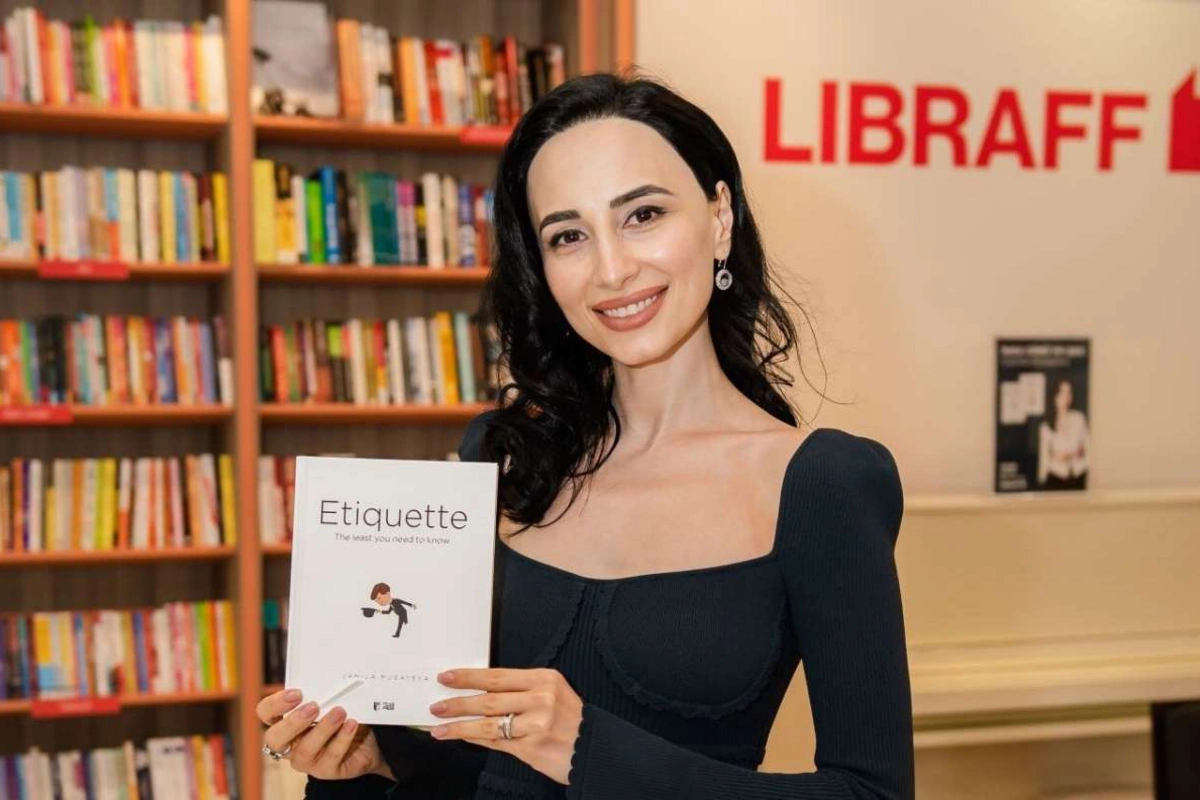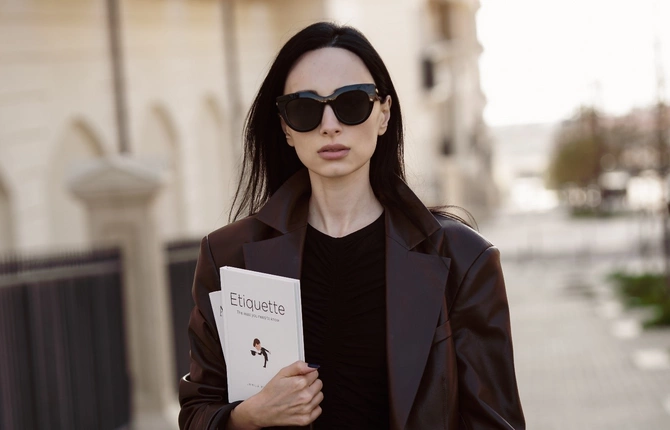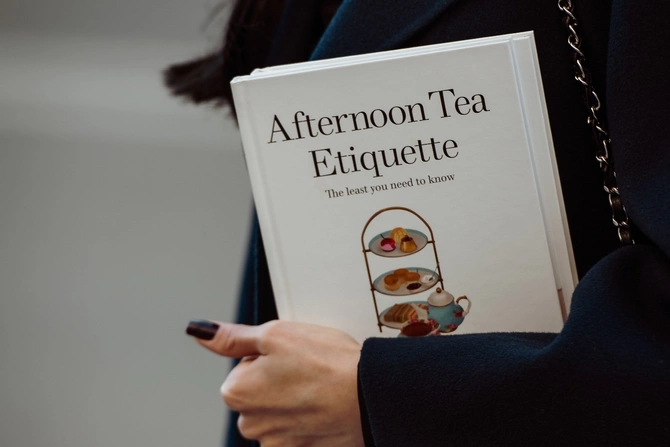
A successful YouTuber from Azerbaijan, Jamila Musayeva, whose content on etiquette and manners has gained over 770 thousand subscribers and more than 23 million views on her channel, shares her view on etiquette, the importance of knowledge, and how facing fears is paramount to success.
Image: Jamila Musayeva/LinkedIn
Jamila Musayeva is a 31-year-old YouTuber, etiquette consultant, book author, and business owner whose rise to fame was so fast it took even her by surprise. What originally started as educational content on etiquette turned into a channel focusing on all things beauty, fashion, and lifestyle. Although Jamila is based in Baku, she chose to create her videos in English as it became her primary language during her studies, and she feels the most comfortable in it when it comes to teaching.
Her educational background is rather impressive. For her undergrad, Jamila studied International Relations (IR) at George Washington University in Washington DC, where she was admitted at the age of 16 and from which she graduated summa cum laude and was an honour student, having achieved the highest GPA. For her postgrad studies, Jamila moved to Bruges, Belgium, to attend the College of Europe, which she explains is “like Harvard University of Europe.” After finishing her studies, which were fully funded by the EU, Jamila moved back to Baku, where she started working as an EU expert at ADA University. It was there that she decided to teach classes on etiquette as well. Having taken a course on etiquette at George Washington University and a course on roundtable discussions and international protocol at the College of Europe as part of her IR studies, Jamila remembers being astonished that “there is a path like that, that you can be an etiquette consultant or teacher never occurred to me.”
Following that, Jamila completed an intense seven-day course at the International Etiquette and Protocol Academy of London to become a certified etiquette consultant and teacher. Although now she believes one doesn’t need to complete a course to become a consultant, she also notes that “being certified really helps you to establish credibility that you were certified to teach this.”

Image: courtesy
This proves especially helpful when Jamila receives comments questioning her legitimacy in teaching etiquette to the Western audience. “Why is a girl from Eastern Europe, most of the people from America and Europe view us like that,” Jamila explains, “why is she teaching us, the Western world, about it [etiquette]? Who is she to tell me how to hold my fork and knife? This is where I say my educational background comes to the rescue.” Although the fact that people find the ethnic or racial identity of a person to be something potentially career-limiting is discriminatory, Jamila found her education to be the best defence against such attacks. “Knowledge is something no one can take away from you, no matter where you are. Even if I lose everything I own right now, if the world collapses in a weird way, and I find myself in a new country having to build myself again, I will be able to do that, because I’ve gotten an education that no one can take away from me. I find it a very powerful tool against anyone and anything.”
Instead of trying to hide her ethnic identity and give in to the stereotype of an etiquette consultant as a blonde, white woman with a British accent, Jamila proudly shares the traditions of Azerbaijan in some of her videos. Among them are



In November 2020, during the Second Karabakh War, Jamila posted a video

At first, Jamila responded to hateful comments by defending herself. However, she soon stopped wasting her energy and started blocking and ignoring the haters. “I said what I wanted to say, my message was heard. In Azerbaijani they say, ‘The dogs bark, but the caravan goes on,’ so I was the caravan. I was going and spreading my message and they were the dogs that were barking at me. You have to ignore the hate and tell your message when you have to speak up.”

Image: courtesy
This feeling of representing Azerbaijan has been present throughout Jamila’s life. In 2008, when Jamila moved to the US to attend George Washington University, she was the first Azerbaijani girl to study there and felt the need to push for her culture and country to be recognized. Once during International Week, when students got to know each other’s countries, Jamila noticed that the flag of Azerbaijan was missing among other country flags. Jamila refused to accept this and went straight to the President of George Washington University to demand that Azerbaijan’s flag be installed as she felt misrepresented and disrespected. Years later, Jamila confesses, “I don't know how I did it, I still have the letter from the President. I walk in, I'm 16, and there’s a room of older men—his assistants, directors of schools, men in suits.” After Jamila’s appeal, they put not just one but many flags of Azerbaijan across the campus. “For me, it was always about how I could represent my country in the best light. Because people didn’t know much about Azerbaijan, I had the opportunity to make it outstanding in their minds. I didn’t have to reteach them about Azerbaijan. Their impression of Azerbaijan was just me. A friend from Washington once told me: ‘Do you know that you are doing more for Azerbaijan than the ambassador?’” she laughs.
Jamila finds it disappointing when young Azerbaijanis move abroad and try to erase their ethnic identity. She gives examples of fourth-generation Arab and Persian communities in the US still identifying as Arabs and Persians and wishes Azerbaijanis would follow their example instead. “I saw it in the US a lot when I met Azerbaijanis who were like ‘Oh, Azerbaijan sucks. I am American now. This is my lifestyle, and this is what I wear’,” Jamila says mockingly. “But why? Why can’t you take the good things from America, like freedom of speech, but also take the good things from your culture? Don’t forget where you come from.”
Jamila’s decision to write books on etiquette came after noticing that most of them were either outdated or too plain. When writing her books—Etiquette: The least you need to know (2019) and Afternoon Tea Etiquette (2021)—her main goal was for them to be applicable to modern living while being concise and comprehensible. Yet she tries to challenge the public’s perception of etiquette not only through her books and videos but simply through her daily outfits. “Every time I post a picture in jeans or Birkenstocks, I get a comment saying, ‘This is so controversial. I thought you were elegant.’ I don’t think my slippers define my femininity. Because elegance is not what you wear.” “I don’t like when people think that femininity is wearing pearls, being blond, and having perfect nail polish,” she says when pointing out how old-fashioned the perception of how an etiquette consultant should look is. Jamila wants people to realize that etiquette is more than looks. “For some people, etiquette is how to sit and how to stand, but for me, it is about minding your own business and being mindful of others.”

Image: courtesy
As Jamila’s channel grew, so did her audience’s interest in her personal life. However, Jamila makes it clear that she will not sacrifice her privacy to get more views and likes on social media. She explains that she didn’t start her channel to reveal her private life but to “bring knowledge to people that can’t have access to etiquette schools, or [that are] not exposed to certain manners at home.”
When it comes to raising her children, Jamila looks back at her own life and prefers to implement things that her family gave her—such as languages. Jamila is multilingual—she speaks Azerbaijani, English, Russian, French, Spanish, Arabic, and German—and wants her children to follow her path. Her daughter, who is only eight years old, is fluent in four languages—Azerbaijani, Russian, French, and English, and is now learning Spanish. Jamila’s five-year-old son is learning French and English as well. “I’ve instilled certain things that I’ve learned as a child myself, like learning a lot of languages. So, I try to incorporate things I was brought up with—making their own bed, being disciplined, and putting all their things back in their place. I’m teaching most things in life that I think are important to know.”
Jamila is not rushing to teach etiquette to her kids yet, as she explains, “Etiquette lessons are so difficult to explain at this age.” She believes the best way to teach kids etiquette is to set an example for them. She notices it in her daughter’s attempts to act like her. “Hopefully, with years, having grown up in a household where I value those things, I think they also will try to value them.” As of now, their understanding of etiquette mainly consists of admiring their mothers’ books on etiquette. “They love looking at my books and looking through pictures. My daughter takes my book to school as well, like ‘This is my mom’s book,’” Jamila shares proudly.
She doesn’t expect her kids to be perfect and wants them to have a normal childhood and to be able to express themselves. “They are kids, after all, they have to express their emotions. I try to talk to them when they have emotional breakdowns to understand what their reason is... People sometimes expect my kids to be a certain way, but they are as emotional as everyone else’s kids.”
Despite her success on YouTube, Jamila doesn’t want to stop teaching and working with clients as she still considers it her primary job. “That is still my main source of income and work. YouTube, for me, is sharing my knowledge with the world and keeping my channel growing. It’s not really my primary workspace.” Jamila keeps her income streams diversified. Besides teaching etiquette, doing “private consultation and classes either in person or online,” and YouTube, she also has Patreon book and film clubs, where she uploads unique content with her etiquette analyses and sells her books and online courses. However, something Jamila doesn’t share on her YouTube channel is her business achievements. Jamila co-founded the first and only gym for kids in Azerbaijan, Gymbala.
Opened in 2018, today Gymbala is a fully equipped gym for children from 15 months to seven years old, with professional trainers working with them. The idea to open Gymbala came to Jamila and her sister-in-law when they were looking for a gym for their kids and realized that no gym was equipped and designated for kids. Although such a successful business project is something many would boast about, Jamila prefers to keep her etiquette career separate from what she calls “the local business,” as she believes “it’s not relevant for people who watch me.”
Despite appearances, Jamila, like many of us, has her own struggles, fears, and anxieties. As a child, Jamila wanted to become a ballerina, “but growing up in a conservative Azerbaijani family” meant that such a career choice wouldn’t be possible. “That childhood dream is still in there. It’s interesting that anytime I need a dance teacher, I go to a choreography or ballet studio, I get asked, ‘Are you a former ballerina?’ I think it’s the desire in me that had been so strong that I have always aspired to look like a ballerina.” She believes that her career as an etiquette teacher stems from her childhood desire to be on stage and perform in front of an audience.
When it comes to mental health, Jamila has many fears and is struggling with agoraphobia (fear of crowds and open spaces) as a result of attending a concert as a child, where she was “pushed from both sides of the crowd.” Even now, she avoids crowded places and limits her meet-and-greet events to 10 people. Despite that, Jamila had to face her biggest phobia this year. “When this year I went to Umrah (Muslim pilgrimage to Mecca), that was my biggest fear. Because in Mecca, you have to do Seven Rounds [around the Kaaba] in a huge crowd of people. At first, I was hysterical. When I entered, I thought, ‘I am going to die here.’ I was out of breath.” Jamila believes that the same approach should be used when facing challenges in life, “It really helps you to understand, that this fear is in your head, and that you can actually conquer it, and when you conquer it, it gives you such a boost of self-confidence.”
However, the hardest part was overcoming her imposter syndrome, whether when writing her books or starting her YouTube channel. “I’ve realized that what we fear is how we perceive ourselves. You don’t think you are smart enough; you don’t think you are good enough; it all comes from your own understanding of yourself. But people see it completely differently. It really helped in understanding that there’s always a place for me. When people tell me, ‘Oh, YouTube now is so saturated, it is so difficult to get there, to have a successful channel,’ I always say, there’s always going to be room for you as well. No one has to be pushed away to make room for you. The world is so large that there is always a place for you to shine.”
Share on social media